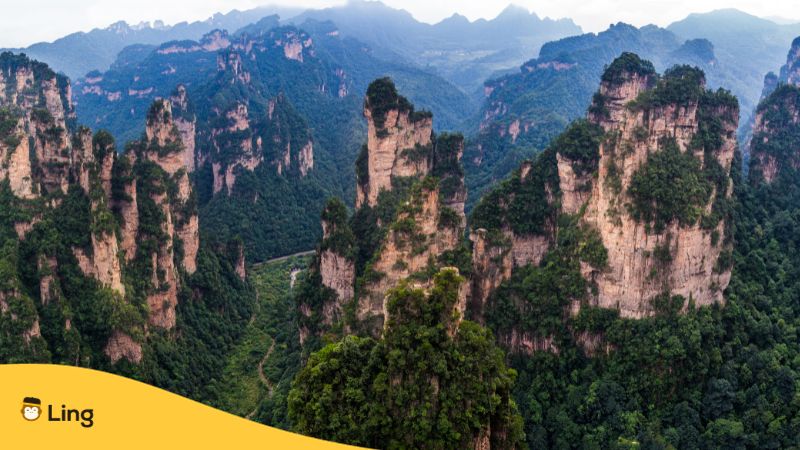Get ready to add a touch of adventure to your vocabulary! We’re about to dive into the world of Chinese words for hiking, where each term is like a stepping stone on the path to outdoor excitement. So, lace up your hiking shoes and join us on this linguistic trek through the great outdoors of the Chinese language!
What Is “Hiking” In Chinese?
In Chinese, “hiking” is “远足” (Yuǎnzú), meaning “climbing mountains.” But it’s not just about peaks; it’s a journey into nature, culture, and history. So, picture yourself not just walking but climbing into a world where every mountain tells a story, where you discover hidden temples, and where nature’s beauty intertwines with ancient traditions and insights. Hiking does not only offer physical activity but a journey of appreciation and connection to nature.
Hiking in China is stunning because of its diverse landscapes, rich history, and warm hospitality. From picturesque mountains (山/Shān) to ancient temples (古庙/Gǔ miào), each hike is a blend of natural beauty and cultural immersion, making it a huge treat for the sight!

Common Chinese Words For Hiking
Before you hop into your hiking boots in China, familiarize yourself with these words and discover their peace and wisdom-filled meanings. Without further ado, let us begin this linguistic hiking trip!
Mountain – 山
In Chinese, the word for “mountain” is “山” (Shān). This character symbolizes the essence of China’s landscapes and the heart of its hiking culture.
The background of this term is deeply rooted in Chinese history and philosophy. ‘Shān’ holds a revered place in Chinese culture, often seen as the dwelling place of gods and spirits. Ancient philosophers and scholars regarded mountains as the perfect setting for contemplation and enlightenment, inspiring famous texts like the “Dao De Jing” by Laozi.
Use this opportunity of hiking to not only take a break from urban life but also to connect with nature through the mountains. Try visiting the breathtaking Zhangjiajie mountains in China, Hunan Province. In fact, it is featured in the movie Avatar!
Trail – 步道
In Chinese, the word for “trail” is “步道” (Bùdào), which beautifully encapsulates the essence of hiking in this culture-rich land.
The background of this term is connected to the ancient art of walking meditation and mindfulness. In the context of hiking, this translation is profound. Hiking in China is not about racing to a destination; it’s about embracing the journey itself. Each step along the “步道” (Bùdào) is an opportunity to connect with nature, to reflect, and to find inner peace. It’s a chance to walk in the footsteps of ancient philosophers who sought enlightenment in the tranquil beauty of the mountains and forests.
Forest – 森林
In Chinese, the word for “forest” is “森林” (Sēnlín), and its Chinese translation reveals a fascinating connection to hiking and the natural world. While hiking, oftentimes your path takes you through these rich and flourishing “森林” (Sēnlín), allowing you to immerse yourself in the heart of the wilderness.
Here is the ancient wisdom of living in harmony with the environment and the belief in the therapeutic power of nature through the rustling sounds of swaying forest trees. There is a beautiful bamboo forest called the “Shunan Bamboo Forest” that is really worth visiting!
Stream – 溪流
溪流 (Xīliú), or stream, underscores the deep respect for the environment and the importance of preserving its pristine beauty and cleanliness. In the past, these streams were very important as they provided clean water for daily use. Thus, they deserved respect. On the contrary, when they are disrespected, oftentimes they become dirty, which makes them unusable.
On your hiking journey, you may encounter “溪流” (Xīliú), where hikers can rest beside the tranquil waters, listen to the soothing melody of the washing stream, and connect with the peaceful rhythms of the earth.
River – 河
The translation for “river” is “河” (Hé), and it unveils a fascinating connection to the art of hiking in China. “河” (Hé) provides opportunities to connect with the vital forces of nature, to cross ancient bridges, and to marvel at the ever-changing scenery. It’s an invitation to explore the essence of China’s natural and cultural wonders. Moreover, hé has played a pivotal role in Chinese culture for centuries, serving as a source of sustenance, trade routes, and spiritual inspiration. One example is the longest river in Eurasia, the Yangtze River. It is a river that served the Chinese people well throughout history.
Map – 地图
Called “地图” (Dìtú), or map, it carries a direct significance when hiking in China, serving as an indispensable tool for navigating its diverse and often intricate terrain. When embarking on a hiking expedition in this vast country, a “地图” (Dìtú) becomes more than a graphical representation; it becomes your passport to exploring China’s natural wonders, historical sites, and hidden trails. With it in hand, you can confidently traverse the landscapes while delving into the rich tapestry of China’s geography and culture, ensuring an informed and enjoyable hiking experience.
Learn Chinese With Ling
Did you enjoy this article? Do not stop learning, as we have a lot more in store just for you! Have a friend who has a birthday, and you’re looking for a gift? Are you intrigued by superstitions that surround the Chinese culture? We have all the answers perfectly tailored to your questions here in the Ling blog! And above all, we offer you an essential study buddy for learning the Chinese language itself—the Ling app!
The Ling app is your top choice for mastering Chinese and 60+ other languages of the world. It makes learning fun through gamification, offers comprehensive lessons, and promotes flexible learning in bite-sized chunks to avoid overwhelming yourself. Plus, it’s budget-friendly, and has a freemium model that caters to a wide range of languages, echoing accessibility.
So, if you’re ready to dive into the world of Chinese, the Ling app is your ideal, engaging, and efficient companion! Give it a try today by downloading for free it on the Google Play Store or the Apple App Store!



































































